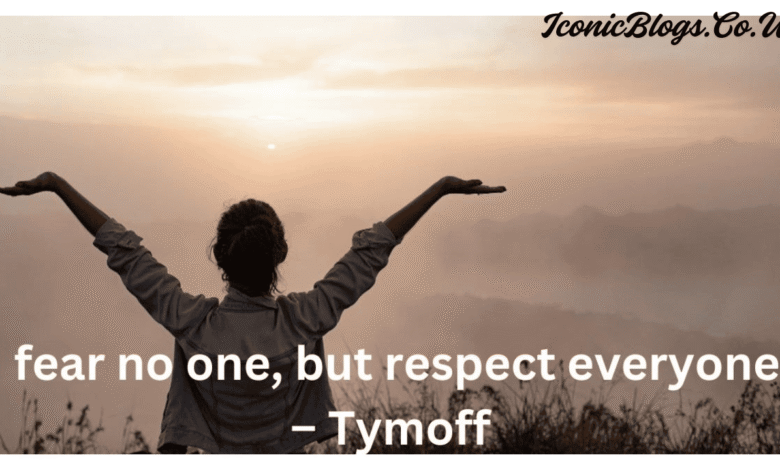i fear no one, but respect everyone. – tymoff: The Philosophy of Courage, Humility, and Character

Understanding the Quote “I fear no one, but respect everyone. – tymoff”
The phrase “I fear no one, but respect everyone. – tymoff” encapsulates a powerful ideology. In just a few words, it conveys a life philosophy rooted in inner strength, emotional intelligence, self-confidence, and deep respect for others. While the origin of the quote is often credited to Tymoff, an enigmatic presence in motivational quote culture, its message resonates across generations and cultures.
In a world driven by social media status, egos, and dominance struggles, this quote offers a refreshing perspective. It champions fearlessness—not the absence of fear but mastery over it—and balances it with a healthy dose of humility. This article will delve deeply into the meaning, implications, and real-life applications of “I fear no one, but respect everyone. – Tymoff, dissecting its philosophical roots, leadership values, psychological benefits, and social relevance in the 21st century.
The Dual Power of the Quote: Fearlessness and Respect
At its core, “I fear no one, but respect everyone. – tymoff” communicates two dominant themes: fearlessness and respect. These two qualities are often seen as contradictory, but when combined, they form the foundation of a strong, stable, and ethical personality.
Fearlessness: A Misunderstood Virtue
To say “I fear no one” is not about arrogance or reckless bravery. It’s about emotional resilience—the ability to maintain composure and rationality under pressure. It’s the mindset that empowers individuals to stand their ground, voice their opinions, and uphold justice even when faced with opposition.
Fearlessness is:
- Confidence in one’s values
- Freedom from manipulation
- Willingness to take risks
- Independence of thought
Respect for Everyone: The Root of True Strength
Respect is often mistaken for submission or weakness. However, in the Tymoff quote, it’s a display of grace and maturity. Respecting everyone, regardless of their social status, beliefs, or background, requires strength of character. It demonstrates open-mindedness, emotional intelligence, and self-awareness.

Respect means:
- Listening actively
- Valuing diverse opinions
- Treating others with dignity
- Practicing empathy
Philosophical Foundation: Stoicism, Honor, and Ethical Living
The ideals behind “I fear no one, but respect everyone. – tymoff” are reminiscent of Stoic philosophy and ancient warrior codes of honor like Bushido and Chivalry. These philosophies promoted balance between inner fortitude and social harmony.
Stoicism and the Tymoff Mindset
Stoics like Marcus Aurelius and Epictetus emphasized courage, control over emotion, and ethical behavior, values perfectly aligned with Tymoff’s quote.
Key Stoic beliefs reflected in the quote:
- Do not fear what is beyond your control.
- Respect nature, people, and the natural order.
- Act with virtue, regardless of others’ actions.
Eastern Philosophy and Humility
In Eastern thought, especially in Confucianism and Buddhism, humility and respect are cornerstones of a meaningful life. The phrase “I fear no one, but respect everyone” could easily sit among teachings from Lao Tzu or the Dhammapada.
The Psychological Benefits of Living This Mantra
Adopting the mindset of “I fear no one, but respect everyone. – Tymoff has transformative mental health benefits. It promotes clarity, peace, and confidence. Psychologists agree that fear and egotism are major contributors to anxiety, depression, and social conflict.
Here’s how this mindset helps:
1. Builds Self-Esteem and Reduces Insecurity
Fear often comes from perceived inferiority. When you remove fear from interpersonal dynamics, you free yourself from comparison and competition.
2. Improves Relationships
Respecting everyone, even those who disagree with or challenge you, leads to healthier, more authentic connections. It reduces conflict and fosters understanding.
3. Encourages Assertiveness
This quote promotes assertiveness without aggression—a communication style where you advocate for yourself while respecting others.
Real-World Applications: From Boardrooms to Street Corners
The principles in “I fear no one, but respect everyone. – tymoff” are universally applicable. Whether you’re a CEO, a teacher, a student, or a street performer, this mindset can serve as a personal compass.
In Leadership
Great leaders exhibit fearlessness in decision-making and respect in delegation. Leaders like Nelson Mandela, Mahatma Gandhi, and Angela Merkel embodied this balance.
A fearless leader:
- Makes tough calls
- Stands for their team
- Faces criticism head-on
A respectful leader:
- Listens to feedback
- Acknowledges contributions
- Uplifts those around them
In Personal Growth
As individuals, applying this philosophy means:
- Standing up to bullies while showing compassion
- Having boundaries without becoming hostile
- Speaking the truth without being disrespectful
How the Tymoff Quote Counters Modern Toxicity
We live in a time of internet bravado, political polarization, and performative outrage. The philosophy of “I fear no one, but respect everyone. – Tymoff offers a strong antidote to this culture.
Dismantling Ego Culture
Social media thrives on likes, dominance, and one-upmanship. Tymoff’s mindset challenges this by saying: you don’t need to dominate to be strong, and you don’t need to belittle to be respected.
Promoting Constructive Dialogue
Respect for differing opinions is essential in today’s divided world. This mindset fosters healthy debate instead of toxic argument.
Encouraging Authenticity
Fear of judgment is a major barrier to authenticity. Living by Tymoff’s words helps people embrace who they are, unapologetically yet humbly.
Teaching Philosophy to the Next Generation
Parents, educators, and mentors can pass on the legacy of “I fear no one, but respect everyone. – Tymoff”:
- Modeling calm assertiveness and respect in front of children
- Teaching emotional intelligence and active listening
- Encouraging kids to stand up for themselves kindly
Embedding this mantra in early education can shape a more balanced, empathetic future generation.
Stories and Historical Examples That Reflect This Quote
Throughout history, some figures embodied this principle long before Tymoff coined it.

Martin Luther King Jr.
He feared no one in the face of injustice but always respected even his opponents, advocating non-violence and civil discourse.
Malala Yousafzai
Fearless in speaking out for girls’ education, yet respectful of all cultures and beliefs, Malala is a living example of the Tymoff mindset.
Viktor Frankl
A Holocaust survivor and psychologist, Frankl exemplified the highest level of human dignity, never bowing to fear and always upholding respect, even in concentration camps.
Conclusion: Why “I fear no one, but respect everyone. – tymoff” Is a Timeless Life Motto
“I fear no one, but respect everyone. – tymoff” is more than a quote—it’s a code of conduct, a lens to view the world, and a standard to live by. It teaches us that true strength is not in domination, but in calm composure; not in fear, but in character; not in arrogance, but in grounded respect.
In a world that often demands aggression or submission, this quote offers a third path—one of balance, integrity, and inner peace. It’s a philosophy for leaders, learners, and everyday individuals seeking to live with courage and conscience.
Let us not just admire the words of Tymoff but live them—in every conversation, every decision, and every interaction.
Also Read: Angelie Grace Dye: Exploring the Life, Influence, and Rising Popularity of a Name Making Headlines
